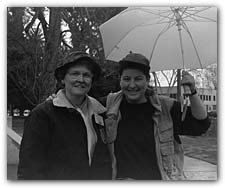Main Menu · Search ·Current Issue ·Contact ·Archives ·Centennial ·Letters to the Editor ·FAQs
| Home | Second Calling |
| Vietnam through Women's Eyes | Yesterday's News |
| Follow the Music | |

|
| Filmmaker Kates (right) with Vietnam veteran Linda McClenahan, one of her subjects and the chair of the California Vietnam Memorial Commission. |